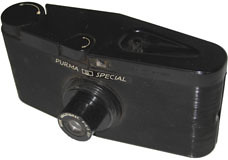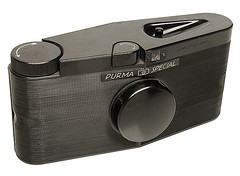
|
| Purma Special, lens out |
Purma was a brand of 127 roll film viewfinder camera made in England by Purma Cameras, and sold by R. F. Hunter of London.
The most common, the Purma Special was made of Bakelite, apart from the glass lens, plastic viewfinder optics and shutter & spring mechanisms.
There were several interesting features;
- The focal plane is curved, with a solid metal, curved focal-plane shutter with three speeds, controlled by a weight, which varied the slit-width. The width/shutter speed depends on which way up the camera is held. Horizontal gives medium speed, vertical with winding knob down gives slow, and vertical, knob up, fast. See the Living History site for photos of the shutter.
- The lens is sprung to telescope out of the body when the screw-on lens cap is removed. Capping (and so collapsing) the lens locks the shutter release - which, unusually, is on the photographer's left.
- the ever-ready case opens upwards from underneath the lens, unlike most cases, which open forward from the back.
- The Purma is said to be the first camera to have plastic optics, although this is in the viewfinder only.

|
| Purma Special, lens cap on |
There were three models:
- Purma Speed, introduced 1936; enamelled metal/chrome body
- Purma Special, introduced 1937; all Bakelite body
- Purma Plus, introduced 1951 and lasting until ~1959; aluminium body
Specification
- Country of Origin: England
- In production: 1936-1959 (suspended during World War II)
- Shutter: curved focal-plane gravity controlled, 3-speeds, Slow: 1/25, Medium: 1/150, Fast: 1/450.
- Lens: (Purma Special) Beck Anastigmat, 2¼ inch (~57mm) f/6.3, collapsible
- Film: 127 roll film, 16 31mm square exposures
Reference: Coe, Brian, Cameras, From Daguerreotypes to Instant Pictures, pp.129-132, Marshall Cavendish Editions, London, 1978
Links
- Purma Special on the Living Image Museum
- Purma on the OneTwoSeven site dedicated to 127 film photography
- Purma Cameras on David Gardner's Great British Cameras site - an extensive article with photos of all three models.
- Purma Special at Scott's Photographica [1]